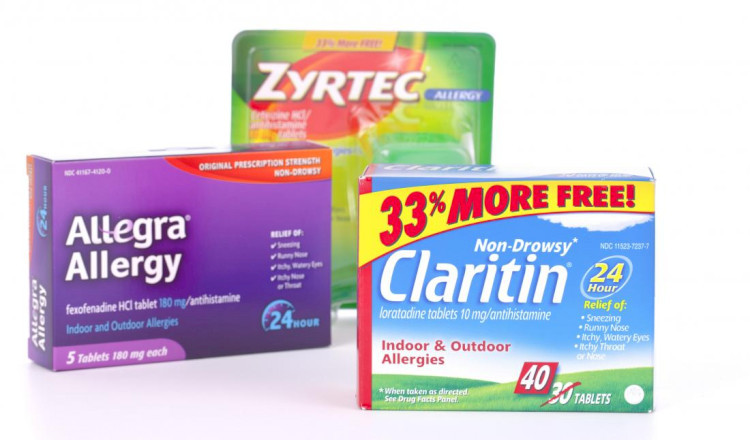What Allergy Medication Is Safe With Adderall?
In our latest question and answer, the pharmacist discusses allergies medications that are safe to take with Adderall.

Question
I am currently taking Adderall 20 mg XR and I am having allergies lately. What OTC allergy medicine can I take that won’t interact?

Answered by Dr. Brian Staiger, PharmD
Medical Content Reviewed By HelloPharmacist
Staff
Last updated Jun 27, 2025
Key points
- Antihistamines (e.g. Claritin, Zyrtec and Allegra) are considered safe to take with Adderall.
- Steroid nasal sprays (e.g. Flonase, Rhinocort, Nasacort AQ) are also considered safe to use with Adderall.
- Nasal decongestants (e.g. Sudafed) should not be used with Adderall unless directed by your doctor.
Hello and thanks for reaching out!
There are quite a few options when it comes to taking an over-the-counter (OTC) medication to relieve symptoms of allergies that are safe to take with Adderall.
First and foremost, most antihistamines, such as Benadryl, Claritin, and Zyrtec are safe to take.
Safe Antihistamines With Adderall

Our body releases the histamine in many different scenarios, but most commonly when we are exposed to an allergen (e.g. pollen) which triggers well know allergy symptoms, such as:
- Itching
- Watery eyes
- Sneezing
- Runny nose,
Antihistamines are drugs used to reduce the effects of histamine.
They are used to treat allergy symptoms and, due to the sedative properties of some, can help us fall asleep at night.
As mentioned, most antihistamines are perfectly safe to take with Adderall, and I discuss your options in more detail below.
Benadryl (Diphenhydramine)
Benadryl is a first-generation antihistamine used to treat the symptoms of allergies including:
- Sneezing
- Itching
- Hives
- Itchy/watery eyes
- Itchy nose/throat/skin
- Promoting sleep
- Preventing motion sickness
It is safe to take with Adderall as there are no known interactions.
Although Benadryl is a very effective antihistamine, it generally is used only in the evening due to it's strong sedative properties.
In fact, Benadryl is a common ingredient in nighttime sleep products for this reason and would not be a good choice if you need to be alert or operate a car as it may cause drowsiness and impaired coordination.
Other common side effects include:
- Dizziness
- Headache
- Stomach ache
- Constipation
- Blurred vision
- Constipation
Benadryl is generally dosed as 1 capsule or tablet (25 mg diphenhydramine) orally every 4 to 6 hours as needed.
Zyrtec (Cetirizine)
Zyrtec is a second-generation antihistamine and is available over the counter without a prescription. It is safe to take with Adderall.
Second-generation antihistamines are commonly used to treat allergic rhinitis, seasonal allergies, and itchy or watery eyes.
While not nearly as sedating as Benadryl, Zyrtec has also been known to cause some drowsiness (in around 10% of people).
Other common side effects include:
- Abdominal pain
- Headache
- Dry mucous membranes
- Diarrhea
- Pharyngitis
- Dizziness
- Nausea/vomiting
Zyrtec can generally be dosed once a day, as the effects last 24 hours.
Claritin (Loratadine)
Claritin is an OTC second-generation antihistamine and, like Zyrtec, also lasts 24 hours per day. It is safe to take with Adderall
It is considered essentially non-drowsy, making it a great choice for daily use.
Common side effects include:
- Abdominal pain
- Headache
- Dry mucous membranes
- Diarrhea
- Pharyngitis
Allegra (Fexofenadine)
Allegra is another second-generation antihistamine, and, just like Claritin and Zyrtec, lasts 24 hours per day.
It is considered non-drowsy and it is also safe to take with Adderall.
This medication is available in multiple strengths, and depending on which you choose, can be dosed once or twice a day (60mg tablets are taken twice daily while 180mg tablets are taken once daily).
It is important not to take this medication with fruit juice as it will affect the medication's absorption. Common side effects include:
- Headache
- Dyspepsia
- Fever
- Cough
- Myalgia
- Ringing in the ears
- Dizziness
Xyzal (Levocetirizine)
Last but not least we have Xyzal, sometimes considered a 'third-generation' antihistamine.
It lasts 24 hours per day and has a low risk of sedation.
Like the other antihistamines on this list, it is safe to take with Adderall.
Which To Choose?
Second-generation antihistamines (and Xyzal) are often the best choice to take on a daily basis for treating allergy symptoms while taking Adderall.
The once-a-day dosing offers the most convenience and they are mostly non-drowsy, unlike Benadryl.
Each antihistamine drug is available in a variety of formulations (e.g. liquid, tablets etc...) so you can pick the option that makes the most sense for you.
Steroid Nasal Sprays

When we think 'allergy meds', we generally think of antihistamines, which is why I started there first.
However, another drug class is also indicated for the treatment of allergies, and that is nasal steroids. These drugs include:
- Rhinocort
- Flonase
- Flonase Sensimist
- Nasacort AQ
Steroid nasal sprays are a great option to treat daily allergy symptoms and are safe to use with Adderall. There is no known interaction between them.
All of these nasal sprays are fairly similar in terms of their effectiveness, so my best recommendation is to try a few and pick which is best for you.
Nasal Decongestants
 Although not necessarily an 'allergy' medication, many people choose decongestants if their allergies are causing nasal congestion.
Although not necessarily an 'allergy' medication, many people choose decongestants if their allergies are causing nasal congestion.
You do want to use caution here, however.
Nasal decongestants can raise blood pressure and heart rate, similar to Adderall.
You generally should not combine decongestants with Adderall unless directed by your doctor.
Final Words
Thank you again for reaching out!
I hope you find relief from your allergy symptoms!
-
 Dr. Brian Staiger, PharmD
Dr. Brian Staiger, PharmD
- 24266 views


